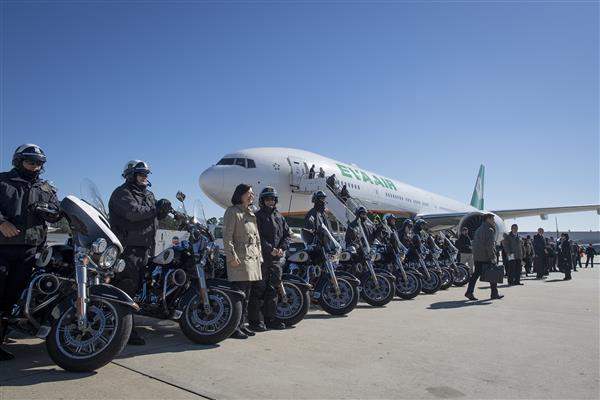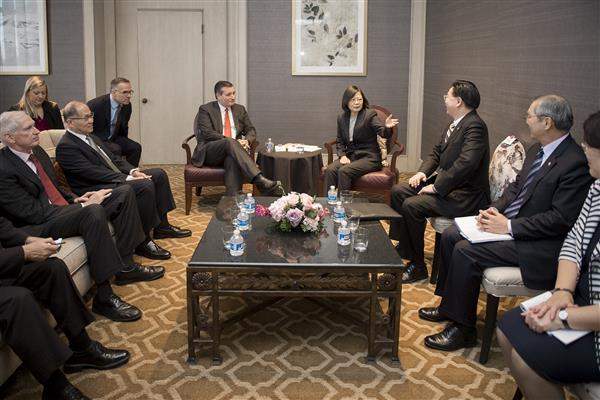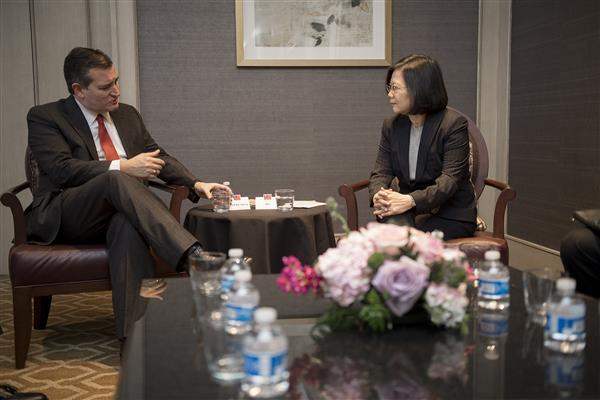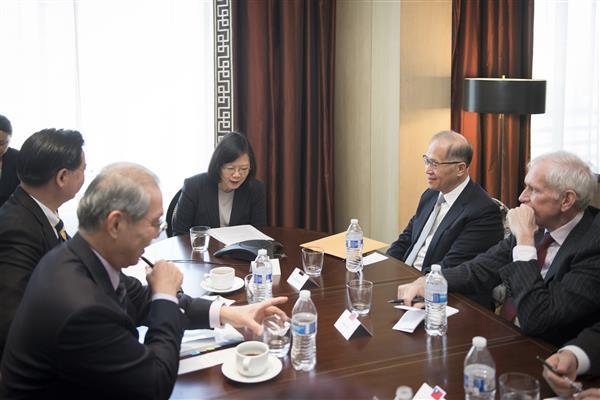News & activities
 News releases
News releases
2017-01-09
President Tsai's itinerary during stopover in Houston
On the afternoon of January 8 Houston time (early morning January 9 Taipei time), National Security Council Deputy Secretary-General Tseng Hou-jen (曾厚仁) revealed (from aboard the president's chartered aircraft bound for Honduras) the itinerary for President Tsai Ing-wen during her just-concluded stopover in Houston.
Deputy Secretary-General Tseng stated that after President Tsai arrived on the morning of January 7 at the Omni Houston Hotel where she was staying, she met for a short talk with American Institute in Taiwan Chairman James Moriarty, who briefed the president on what the Democratic administration has done over the past eight years for Taiwan-US relations. Chairman Moriarty also spoke about the importance that the US attaches to Taiwan-US relations, and said that at a key time such as the present, with a new administration soon to take over the reins of power, they have taken note of the current state of cross-strait relations. The US is trying to persuade mainland China to resume cross-strait dialogue.
Deputy Secretary-General Tseng pointed out that President Tsai specially thanked the US for its arrangements for her stopover, and expressed hope that relations between Taiwan and the new US administration will see further improvement. The president also took advantage of the opportunity to thank the administration of President Barack Obama for its efforts over the past eight years to enhance Taiwan-US relations.
Deputy Secretary-General Tseng pointed out that Houston Mayor Sylvester Turner came to the hotel on January 7 to call on the president. It was the first time the two persons had met. Mayor Turner and President Tsai, both of whom have law degrees, exchanged views on a wide range of issues. The president mentioned that she had been to Houston in 2015 when she was still a presidential candidate, and was accorded excellent hospitality at that time. To welcome her visit this time as president, the city provided a 17-vehicle motorcade that included both a lead car, a trailing car, and motorcycles. This was the highest-level treatment she had ever received, for which she was very grateful.
According to Deputy Secretary-General Tseng, Mayor Turner also mentioned that Houston is the most diverse city in America, even more so than New York. One of four persons in Houston was born in another country. Mayor Turner, graduate of Harvard Law School, spoke about some of the challenges he is facing at the helm of city government, such as the pension reform effort currently underway in Houston. President Tsai exchanged views on this topic with Mayor Turner and invited him to visit Taiwan. The major readily accepted the invitation and said he hoped to find an appropriate time to go.
Deputy Secretary-General Tseng reported that on the morning of January 8 President Tsai spoke via telephone with US Senator John McCain. As chairman of the Senate Committee on Armed Services, Senator McCain is no stranger to Taiwan, and is in fact a long-time friend. During the phone conversation, President Tsai thanked him for his longstanding support and friendship for Taiwan, and she mentioned that soon after her inauguration Senator McCain led a delegation of six senators that traveled aboard a chartered aircraft last June to visit Taiwan, where they expressed support for the president and steadfast friendship toward Taiwan. In addition, the National Defense Authorization Act recently passed by the US Congress eases restrictions on visits to Taiwan by officials from the US Department of Defense, for which the president expressed gratitude.
According to Deputy Secretary-General Tseng, Senator McCain has great confidence in the incoming Trump administration, and feels optimistic. Senator McCain said that, as chairman of the Committee on Armed Services, he has always cared deeply about peace and stability in the Asia-Pacific region, and has been paying close attention to conditions in the South China Sea.
Following the phone call with Senator McCain, US Senator Ted Cruz paid a call on President Tsai at her hotel. During the meeting, the president said that she had a special connection with Houston, for this was her fourth visit there since running for president in 2012. The president also spoke about her visit the previous day to the MD Anderson Cancer Center, the largest research-based medical center in the US. The Taiwan government is planning to establish a medical science park in northern Taiwan's Hsinchu County, so President Tsai and Senator Cruz talked at some length on this subject, and the president expressed hope that Taiwan and the US can continue to boost their trade and investment ties.
According to Deputy Secretary-General Tseng, Senator Cruz expressed the view that the Trump administration has a very strong national security team and will be able to deal with the security challenges currently facing the US. Senator Cruz also mentioned that mainland China had sought to apply pressure on him by requesting that he not meet with President Tsai, but he flatly refused the request because he felt the meeting with the president was a rare opportunity, and he wanted to express support for Taiwan.
On the subject of investment and trade, President Tsai and Senator Cruz exchanged a number of opinions. The president felt that the Trans-Pacific Partnership (TPP) has run into difficulties, but the Taiwan government knows that the Trump team has not ruled out the possibility of taking a bilateral approach to promoting investment, so the signing of a free trade agreement between Taiwan and the US has become a new policy direction for Taiwan. Senator Cruz said he strongly supports the signing of such an agreement between Taiwan and the US, and he hopes that Taiwan-US relations can be further improved.
Deputy Secretary-General Tseng then reported that at the end of President Tsai's stopover in Houston she met with Texas Governor Greg Abbott, who attached great importance to the president's US stopover. During their meeting, the president stated that there are over 100,000 Taiwanese expatriates in Texas, more than 50,000 of whom live in Houston, so Taiwan's expatriates have contributed a lot to Houston and to the state of Texas.
According to Deputy Secretary-General Tseng, the Texas governor indicated that he had never been to Taiwan before but he is quite familiar with Taiwan's situation, and among all US states, Texas is Taiwan's third-largest trading partner because Taiwan has a lot of big investments in Texas. He specially mentioned some major investments by Formosa Plastics Corporation, and expressed hope that he will be able to visit Taiwan in the future.
Deputy Secretary-General Tseng stated that after President Tsai arrived on the morning of January 7 at the Omni Houston Hotel where she was staying, she met for a short talk with American Institute in Taiwan Chairman James Moriarty, who briefed the president on what the Democratic administration has done over the past eight years for Taiwan-US relations. Chairman Moriarty also spoke about the importance that the US attaches to Taiwan-US relations, and said that at a key time such as the present, with a new administration soon to take over the reins of power, they have taken note of the current state of cross-strait relations. The US is trying to persuade mainland China to resume cross-strait dialogue.
Deputy Secretary-General Tseng pointed out that President Tsai specially thanked the US for its arrangements for her stopover, and expressed hope that relations between Taiwan and the new US administration will see further improvement. The president also took advantage of the opportunity to thank the administration of President Barack Obama for its efforts over the past eight years to enhance Taiwan-US relations.
Deputy Secretary-General Tseng pointed out that Houston Mayor Sylvester Turner came to the hotel on January 7 to call on the president. It was the first time the two persons had met. Mayor Turner and President Tsai, both of whom have law degrees, exchanged views on a wide range of issues. The president mentioned that she had been to Houston in 2015 when she was still a presidential candidate, and was accorded excellent hospitality at that time. To welcome her visit this time as president, the city provided a 17-vehicle motorcade that included both a lead car, a trailing car, and motorcycles. This was the highest-level treatment she had ever received, for which she was very grateful.
According to Deputy Secretary-General Tseng, Mayor Turner also mentioned that Houston is the most diverse city in America, even more so than New York. One of four persons in Houston was born in another country. Mayor Turner, graduate of Harvard Law School, spoke about some of the challenges he is facing at the helm of city government, such as the pension reform effort currently underway in Houston. President Tsai exchanged views on this topic with Mayor Turner and invited him to visit Taiwan. The major readily accepted the invitation and said he hoped to find an appropriate time to go.
Deputy Secretary-General Tseng reported that on the morning of January 8 President Tsai spoke via telephone with US Senator John McCain. As chairman of the Senate Committee on Armed Services, Senator McCain is no stranger to Taiwan, and is in fact a long-time friend. During the phone conversation, President Tsai thanked him for his longstanding support and friendship for Taiwan, and she mentioned that soon after her inauguration Senator McCain led a delegation of six senators that traveled aboard a chartered aircraft last June to visit Taiwan, where they expressed support for the president and steadfast friendship toward Taiwan. In addition, the National Defense Authorization Act recently passed by the US Congress eases restrictions on visits to Taiwan by officials from the US Department of Defense, for which the president expressed gratitude.
According to Deputy Secretary-General Tseng, Senator McCain has great confidence in the incoming Trump administration, and feels optimistic. Senator McCain said that, as chairman of the Committee on Armed Services, he has always cared deeply about peace and stability in the Asia-Pacific region, and has been paying close attention to conditions in the South China Sea.
Following the phone call with Senator McCain, US Senator Ted Cruz paid a call on President Tsai at her hotel. During the meeting, the president said that she had a special connection with Houston, for this was her fourth visit there since running for president in 2012. The president also spoke about her visit the previous day to the MD Anderson Cancer Center, the largest research-based medical center in the US. The Taiwan government is planning to establish a medical science park in northern Taiwan's Hsinchu County, so President Tsai and Senator Cruz talked at some length on this subject, and the president expressed hope that Taiwan and the US can continue to boost their trade and investment ties.
According to Deputy Secretary-General Tseng, Senator Cruz expressed the view that the Trump administration has a very strong national security team and will be able to deal with the security challenges currently facing the US. Senator Cruz also mentioned that mainland China had sought to apply pressure on him by requesting that he not meet with President Tsai, but he flatly refused the request because he felt the meeting with the president was a rare opportunity, and he wanted to express support for Taiwan.
On the subject of investment and trade, President Tsai and Senator Cruz exchanged a number of opinions. The president felt that the Trans-Pacific Partnership (TPP) has run into difficulties, but the Taiwan government knows that the Trump team has not ruled out the possibility of taking a bilateral approach to promoting investment, so the signing of a free trade agreement between Taiwan and the US has become a new policy direction for Taiwan. Senator Cruz said he strongly supports the signing of such an agreement between Taiwan and the US, and he hopes that Taiwan-US relations can be further improved.
Deputy Secretary-General Tseng then reported that at the end of President Tsai's stopover in Houston she met with Texas Governor Greg Abbott, who attached great importance to the president's US stopover. During their meeting, the president stated that there are over 100,000 Taiwanese expatriates in Texas, more than 50,000 of whom live in Houston, so Taiwan's expatriates have contributed a lot to Houston and to the state of Texas.
According to Deputy Secretary-General Tseng, the Texas governor indicated that he had never been to Taiwan before but he is quite familiar with Taiwan's situation, and among all US states, Texas is Taiwan's third-largest trading partner because Taiwan has a lot of big investments in Texas. He specially mentioned some major investments by Formosa Plastics Corporation, and expressed hope that he will be able to visit Taiwan in the future.
Related News

2026-01-20
President Lai confers decoration on former Czech Parliament Chamber of Deputies Speaker Markéta Pekarová Adamová
On the afternoon of January 20, President Lai Ching-te conferred the Order of Brilliant Star with Special Grand Cordon upon Markéta P...

2026-01-15
President Lai meets Japan’s former Chief Cabinet Secretary Kato Katsunobu
On the afternoon of January 15, President Lai Ching-te met with a delegation led by Member of the Japanese House of Representatives and form...

2026-01-14
President Lai meets Phoenix Mayor Kate Gallego
On the afternoon of January 14, President Lai Ching-te met with a delegation led by Mayor of the City of Phoenix, Arizona Kate Gallego. In r...

2026-01-13
President Lai meets Canadian parliamentary delegation
On the afternoon of January 13, President Lai Ching-te met with a Canadian parliamentary delegation. In remarks, President Lai thanked the C...

2026-01-06
President Lai meets delegation from European Parliament
On the morning of January 6, President Lai Ching-te met with a delegation from the European Parliament. In remarks, President Lai said that ...







